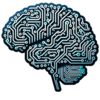Artificial intelligence (AI) has been used in applications throughout industry and academia. In a manner analogous to electricity or computers, AI serves as a general-purpose technology that has numerous applications, including language translation, image recognition, decision-making,[1][2] credit scoring and e-commerce. AI includes the development of machines which can perceive, understand, act and learn a scientific discipline.[3]
- ^ Shin, Minkyu; Kim, Jin; van Opheusden, Bas; Griffiths, Thomas L. (2023). "Superhuman artificial intelligence can improve human decision-making by increasing novelty". Proceedings of the National Academy of Sciences. 120 (12): e2214840120. arXiv:2303.07462. Bibcode:2023PNAS..12014840S. doi:10.1073/pnas.2214840120. PMC 10041097. PMID 36913582.
- ^ Chen, Yiting; Liu, Tracy Xiao; Shan, You; Zhong, Songfa (2023). "The emergence of economic rationality of GPT". Proceedings of the National Academy of Sciences. 120 (51): e2316205120. arXiv:2305.12763. Bibcode:2023PNAS..12016205C. doi:10.1073/pnas.2316205120. PMC 10740389. PMID 38085780.
- ^ Brynjolfsson, Erik; Mitchell, Tom (22 December 2017). "What can machine learning do? Workforce implications". Science. 358 (6370): 1530–1534. Bibcode:2017Sci...358.1530B. doi:10.1126/science.aap8062. PMID 29269459.
